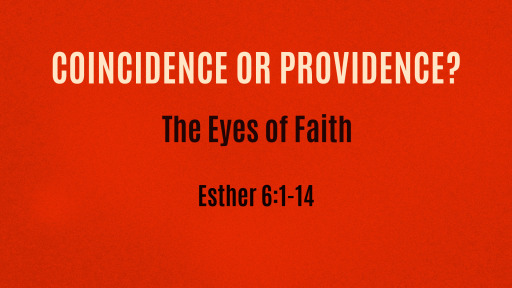Coincidence or Providence?

Introduction
Esther 6:1-14
Sleepless Nights
Honor of Mordecai
It helps to understand that in the ancient Middle East, your garments were considered a part of your being. What you wore actually represented who you were. Consider some examples of this:
• Aaron’s priestly garments were given to his son to wear when he inherited the priestly office (Numbers 20).
• Elisha received Elijah’s mantle/cloak, which represented the designation of prophet (2 Kings 2).
• The army commanders spread their clothes on the stairs for Jehu to walk on, which signified he had authority over their lives (2 Kings 9).
• Luke’s Gospel tells us that when Jesus rode into Jerusalem on a donkey, the people spread out their garments on the road for Him to ride over, symbolically submitting their lives to Jesus (Luke 19).
Not only would Mordecai escape from Haman’s noose, not only would Mordecai receive public adulation, not only would Mordecai receive what Haman had designed for himself, but Haman would be the one to proclaim Mordecai’s greatness to the city! Dramatically and ironically the tables had begun to turn on Haman, who had no choice but to obey the king’s command. We can only begin to imagine Haman’s revulsion and shame as he paraded his archenemy before the people.
Downfall Predicted
God’s Providence
That Haman should end up praising Mordecai also fits the mind-set of wisdom. Proverbs 14:19 states: “The evil will bow before the good, / And the wicked at the gates of the righteous.” Haman, the archetype of evil in Esther, did indeed bow before the good, represented by Mordecai. In his comments on this proverb, David Hubbard could very well be describing Haman’s exaltation of Mordecai: “The note of public embarrassment that plagues the foolish is heightened in the picture of utter public subjection that will be their lot.”5 Both of the proverbs illustrated in chapter 6 exemplify the theme of reversal—a comprehensive theme common both to wisdom literature and to the Book of Esther.
The edict had been written. It was the Law of the Medes and Persians—which means that it was unchangeable. The nearby gallows was seven stories high. A murderer was in control of the kingdom. A callous dictator was on the throne. Sin reigned while sanity had evidently been exiled.
John Newton, the author of the famous hymn Amazing Grace, discipled a young man named William Cowper. But this close relationship didn’t keep Cowper from struggling with bouts of suicidal depression.
One evening in 1774, Cowper called for a carriage and ordered the driver to take him three miles away to the Ouse River in England, where he planned to throw himself from a bridge.
The driver, discerning Cowper’s suicidal intention, breathed a prayer of thanks when a thick fog suddenly moved in and enveloped the area. He purposely lost his way in the dense fog, driving up one road and down another, while Cowper fell into a deep sleep.
Several hours passed before the driver returned to Cowper’s house. Cowper woke up and said, “How is it that we’re home?” The driver answered, “We got lost in the fog, sir … I’m sorry about that.” Cowper paid his fare, went inside, and pondered how he had been spared from harming himself by the clear providence of God.
There, that night in the solitude of his home, William wrote what would become one of his most famous hymns for the Church:
God moves in a mysterious way,
His wonders to perform;
He plants His footsteps in the sea,
And rides upon the storm.
Deep in unfathomable mines
Of never-failing skill,
He treasures up His bright designs
And works His sovereign will.
Judge not the Lord by feeble sense,
But trust Him for His grace;
Behind a frowning Providence
He hides a smiling face.9
